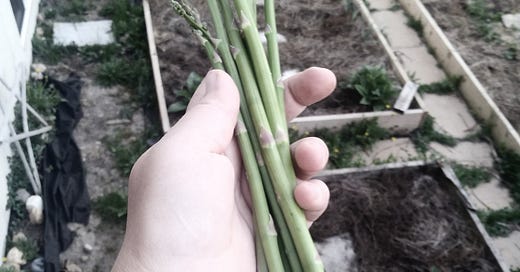I love slow work. Intentional work. Work that has little to no value in a capitalist marketplace. I love manual labour: work that relies on human energy rather than cheap fossil fuel. I firmly believe in this type of work as healing work. It connects our bodies to the real world physical environment. It gives our brains time and space to slow down and focus on a single task, often making much needed room for day dreaming or just good old silence.
This type of work is not efficient. It might save you a bit of money but will rarely make you rich. Sometimes you can build a business out of this work, but there's usually some faster way to do it with a machine or electronic device.
Examples of this type of work that I enjoy: grinding my morning coffee by hand, growing food from seed, foraging for acorns, weeding garden beds, moving compost in a wheelbarrow, washing dishes by hand, sweeping with a broom, sewing by hand, cooking over a fire, mending clothes, weaving on a traditional floor loom, saving seeds, processing and preserving food from scratch, building with hammers and screwdrivers, walking as active transportation.
This slow, intentional work has really become a healing practice for me. It helps ground me. It helps me find my centre. In a time where I often feel scattered, lost, and utterly confused about the state of the world, I have found that I can come back to this work and find meaning and purpose.
I worry, sometimes… okay I worry often… that those close to me whom I love don’t have enough of this work in their lives. I want to share this practice with my kids, my friends, my partner, my parents - with you even! But I’m not sure if slow work is simply my own personal practice that helps me reconnect, or if its the healing balm from which the whole world could benefit. I suspect that we each have our own practice that helps us become realigned. I also suspect that all of us could benefit from more slow, manual, unprofitable work in our lives.
I mentioned in my last post that we did a homeschool project: making a timeline of human history, going back 55,000 years. I wanted to see a visual representation of how long our species has been around, and how much of that time period would have been considered pre-history compared to the time since the agricultural, industrial, and technological revolutions. I wanted to see the vast timespan during which our species survived by doing variations of this slow, intentional, laborious, meaningful work.
Mapping out the timeline with painter’s tape on the basement floor, we could look at the bronze age, stone age, and modern times within the last 5000 years and then see how far back the timeline stretched. For me, it helped frame just how long humans have been living life without efficiency as the end goal.
Sometimes I feel like I’ve jumped off the deep end when I think like this: looking at this vast history in which the human species lived together in a fundamentally different way, it seems now that this is not how humans were meant to live. But it’s not like I’m going to run away to the woods with my family and pretend that our current culture or society or civilization doesn’t exist. For all our sakes, we need to try and find some sort of balance blending computers and tv and tablets with plant identification and bushcraft and manual labour.
For myself though, when I feel like I'm slipping down that rabbit hole, I'm infinitely glad that I’ve found a grounding practice that will help bring me back around; where I can shut down the analytical part of my brain and try to connect with slow meaningful work as intentional practice.






Sometimes I wonder a very same thing. Heavy work is used in the Montessori classroom as a way to help kids who feel disregulated find their bodies in space and collect themselves before or between really big new brain works. I’ve seen it’s effectiveness in children, so it makes sense that adults could emotionally and physically benefit from a more brain/body balance.